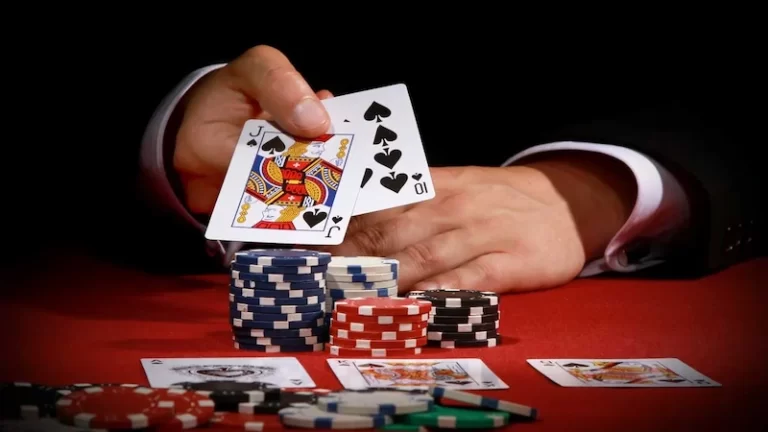Poker – The Ultimate Guide to Mastering the Game
OKBet – Poker is more than just a card game; it’s a blend of skill, strategy, and psychology that has captivated players worldwide for centuries. In this article, we’ll delve into the world of poker, exploring its origins, the rules of the game, tips for beginners, and strategies to improve your play. Whether you’re an experienced gambler or a curious newcomer, this comprehensive guide will help you understand poker and its nuances.
What is Poker?
Poker is a popular card game where players wager money (or chips) on the value of their hand. The goal is to win the pot, which is the sum of all bets placed during a hand. This can be achieved by having the best hand or by convincing other players to fold through strategic betting.
There are many variations of poker, with the most popular being Texas Hold’em, Omaha, and Seven-Card Stud. However, the essence of poker revolves around decision-making, bluffing, and understanding the odds.

The History of Poker
The origins of poker can be traced back to the early 19th century in the United States. It evolved from various European card games such as Poque (France) and Primero (Spain). By the late 1800s, poker had become a staple in saloons and riverboats across America.
Poker gained global popularity in the 20th century, particularly with the advent of tournaments like the World Series of Poker (WSOP) in the 1970s. The online poker boom in the early 2000s further cemented its status as one of the most played card games worldwide.
Basic Rules of Poker
While poker has numerous variations, the basic rules remain consistent across most formats. Here’s a quick overview of how a typical poker game works:
- The Deck: Poker is played with a standard 52-card deck.
- Hand Rankings: The value of hands is ranked from the highest (Royal Flush) to the lowest (High Card).
- Betting Rounds: A poker game consists of multiple betting rounds. Players can choose to bet, call, raise, or fold.
- Winning the Pot: The pot is awarded to the player with the best hand or the last player remaining after others fold.
Hand Rankings (From Highest to Lowest):
- Royal Flush: A, K, Q, J, 10, all in the same suit.
- Straight Flush: Five consecutive cards of the same suit.
- Four of a Kind: Four cards of the same rank.
- Full House: Three cards of one rank and two cards of another rank.
- Flush: Five cards of the same suit, not in sequence.
- Straight: Five sequential cards, not all in the same suit.
- Three of a Kind: Three cards of the same rank.
- Two Pair: Two pairs of cards with the same rank.
- One Pair: Two cards of the same rank.
- High Card: The highest card in your hand if no other combination exists.
Tips for Beginners
If you’re new to poker, here are some essential tips to help you get started:
Learn the Rules
Start by understanding the rules and hand rankings of poker. Each variation has its own nuances, so focus on one, such as Texas Hold’em, before exploring others.
Practice with Free Games
Many online platforms offer free poker games where you can practice without risking real money. Use these opportunities to get comfortable with the gameplay.
Start with Low Stakes
When you’re ready to play with real money, begin with low-stakes games. This allows you to gain experience without significant financial risk.
Focus on Position
Your position at the table can influence your strategy. For example, being in a late position (closer to the dealer) gives you an advantage as you can observe other players’ actions before making your move.
Don’t Bluff Too Much
While bluffing is a critical part of poker, overusing it can be a costly mistake. Bluff strategically and pay attention to how your opponents react.
Advanced Strategies
Once you’ve mastered the basics, it’s time to elevate your poker skills with advanced strategies:
Understand Pot Odds
Pot odds refer to the ratio of the current size of the pot to the cost of a contemplated call. Understanding this concept helps you determine whether calling a bet is profitable in the long run.
Study Your Opponents
The ability to read your opponents is a crucial skill in poker. Look for patterns in their betting behavior, body language (in live games), and how they react to certain situations.
Manage Your Bankroll
Bankroll management is essential for long-term success. Set a budget for poker and stick to it, ensuring you don’t risk more than you can afford to lose.
Mix Up Your Play
Avoid being predictable. Vary your playing style by switching between tight and aggressive strategies. This keeps your opponents guessing and makes it harder for them to read your moves.
Learn from Mistakes
Every poker player makes mistakes, even the professionals. Analyze your losses to identify what went wrong and improve your decision-making in future games.
The Psychology of Poker
Poker is as much a mental game as it is a card game. Here are some psychological aspects to consider:
Patience
Poker requires patience, especially when you’re dealt a series of poor hands. Resist the temptation to make impulsive bets and wait for the right opportunities.
Emotional Control
Avoid letting emotions dictate your decisions. Stay calm and composed, even after losing a big pot or facing a tough opponent.
Bluffing Psychology
Successful bluffing requires a deep understanding of your opponents’ tendencies. Knowing when and how to bluff can give you a significant edge.
Confidence
Confidence is key in poker. Even if you’re unsure about your hand, projecting confidence can influence your opponents and lead to favorable outcomes.
The Rise of Online Poker
The digital era has revolutionized poker, making it accessible to players worldwide. Online poker platforms offer a variety of games, from cash games to tournaments, catering to all skill levels.
Benefits of Online Poker:
- Convenience: Play anytime, anywhere.
- Variety: Access to multiple game formats and stakes.
- Learning Tools: Many platforms offer tutorials and analytics to help players improve.
However, online poker also comes with challenges, such as the lack of physical cues from opponents. To succeed, focus on betting patterns and timing instead.
Why Poker is More Than Just a Game
Poker is not merely about winning money; it’s a game of skill, discipline, and constant learning. It teaches valuable life lessons, such as risk management, emotional control, and strategic thinking.
For many, poker is also a social activity, bringing people together around a table (virtual or physical) to share laughs, stories, and exciting moments.
Conclusion
Poker is a timeless game that combines skill, strategy, and psychology. Whether you’re playing casually with friends or competing in high-stakes tournaments, the thrill of poker is unmatched.
By understanding the rules, practicing regularly, and employing effective strategies, you can enhance your skills and enjoy the game to its fullest. So grab a deck of cards, join a table, and immerse yourself in the fascinating world of poker.






